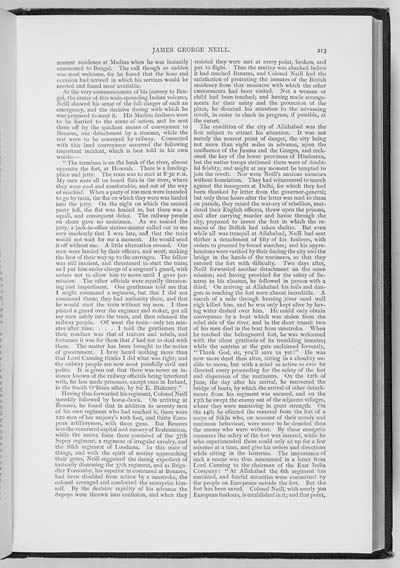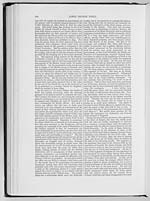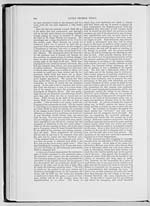213
manent residence at Madras when he was instantly
summoned to Bengal. The call though so sudden
was most welcome, for he found that the hour and
occasion had arrived in which his services would be
needed and found most available.
At the very commencement of his journey to Ben-
gal, the crater of this wide-spreading Indian volcano,
Neill showed his sense of the full danger of such an
emergency, and the decisive daring with which he
was prepared to meet it. His Madras fusileers were
to be hurried to the scene of action, and he sent
them off by the quickest means of conveyance to
Benares, one detachment by a steamer, while the
rest were to be conveyed by railway. Connected
with this land conveyance occurred the following
important incident, which is best told in his own
words:�
"The terminus is on the bank of the river, almost
opposite the fort, at Howrah. There is a landing-
place and jetty. The train was to start at 8.30 P.M.
My men were all on board flats in the river, where
they were cool and comfortable, and out of the way
of mischief. When a party of l00 men were intended
to go by train, the flat on which they were was hauled
into the jetty. On the night on which the second
party left, the flat was hauled in, but there was a
squall, and consequent delay. The railway people
on shore gave no assistance. As we neared the
jetty, a jack-in-office station-master called out to me
very insolently that I was late, and that the train
would not wait for me a moment. He would send
it off without me. A little altercation ensued. Our
men were landed by their officers, and went, making
the best of their way up to the carriages. The fellow
was still insolent, and threatened to start the train;
so I put him under charge of a sergeant's guard, with
orders not to allow him to move until I gave per-
mission. The other officials were equally threaten-
ing and impertinent. One gentleman told me that
I might command a regiment, but that I did not
command them; they had authority there, and that
he would start the train without my men. I then
placed a guard over the engineer and stoker, got all
my men safely into the train, and then released the
railway people. Off went the train�only ten min-
utes after time. . . . I told the gentlemen that
their conduct was that of traitors and rebels, and
fortunate it was for them that / had not to deal with
them. The matter has been brought to the notice
of government. I have heard nothing more than
that Lord Canning thinks I did what was right; and
the railway people are now most painfully civil and
polite. It is given out that there was never an in-
stance known of the railway officials being interfered
with, far less made prisoners, except once in Ireland,
in the Smith O'Brien affair, by Sir E. Blakeney."
Having thus forwarded his regiment, Colonel Neill
speedily followed by horse-dawk. On arriving at
Benares, he found that in addition to seventy men
of his own regiment who had reached it, there were
120 men of her majesty's loth foot, and thirty Euro-
pean artillerymen, with three guns. But Benares
was the venerated capital and nursery of Brahminism,
while the native force there consisted of the 37th
Sepoy regiment, a regiment of irregular cavalry, and
the Sikh regiment of Loodiana. In this state of
things, and with the spirit of mutiny approaching
their gates, Neill suggested the daring expedient of
instantly disarming the 37th regiment, and as Briga-
dier Ponsonby, his superior in command at Benares,
had been disabled from action by a sunstroke, the
colonel arranged and conducted the enterprise him-
self. By the decisive rapidity of his advance the
Sepoys were thrown into confusion, and when they
resisted they were met at every point, broken, and
put to flight. Thus the mutiny was checked before
it had reached Benares, and Colonel Neill had the
satisfaction of protecting the inmates of the British
residency from that massacre with which the other
cantonments had been visited. Not a woman or
child had been touched; and having made arrange-
ments for their safety and the protection of the
place, he directed his attention to the advancing
revolt, in order to check its progress, if possible, at
the outset.
The condition of the city of Allahabad was the
first subject to attract his attention. It was not
merely the nearest point of danger, the city being
not more than eight miles in advance, upon the
confluence of the Jumna and the Ganges, and reck-
oned the key of the lower provinces of Hindostan,
but the native troops stationed there were of doubt-
ful fidelity, and might at any moment be tempted to
join the revolt. Nor were Neill's anxious surmises
without foundation. They had volunteered to march
against the insurgents at Delhi, for which they had
been thanked by letter from the governor-general;
but only three hours after the letter was read to them
on parade, they raised the war-cry of rebellion, mur-
dered their English officers, threw open the prisons,
and after carrying murder and havoc through the
city, prepared to invest the fort in which the re-
mains of the British had taken shelter. But even
while all was tranquil at Allahabad, Neill had sent
thither a detachment of fifty of his fusileers, with
orders to proceed by forced marches; and his appre-
hensions were verified by their finding the city and the
bridge in the hands of the mutineers, so that they
entered the fort with difficulty. Two days after,
Neill forwarded another detachment on the same
mission; and having provided for the safety of Be-
nares in his absence, he followed in person with a
third. On arriving at Allahabad his toils and dan-
gers in reaching the fort were almost incredible. A
march of a mile through burning Driver sand well
nigh killed him, and he was only kept alive by hav-
ing water dashed over him. He could only obtain
conveyance by a boat which was stolen from the
rebel side of the river, and in the short transit two
of his men died in the boat from sunstroke. When
he reached the beleaguered fort, he was welcomed
with the silent gratitude of its trembling inmates;
while the sentries at the gate exclaimed fervently,
"Thank God, sir, you'll save us yet!" He was
now more dead than alive, sitting in a choultry un-
able to move, but with a mind as active as ever he
directed every proceeding for the safety of the fort
and dispersion of the mutineers. On the 12th of
June, the day after his arrival, he recovered the
bridge of boats, by which the arrival of other detach-
ments from his regiment was secured, and on the
13th he swept the enemy out of the adjacent villages,
where they were mustering in great strength. On
the 14th he effected the removal from the fort of a
corps of Sikhs who, on account of their unruly and
mutinous behaviour, were more to be dreaded than
the enemy who were without. By these energetic
measures the safety of the fort was insured, while he
who superintended them could only sit up for a few
minutes at a time, and give his orders and directions
while sitting in the batteries. The importance of
such a rescue was thus announced in a letter from
Lord Canning to the chairman of the East India
Company: "At Allahabad the 6th regiment has
mutinied, and fearful atrocities were committed by
the people on Europeans outside the fort. But the
fort has been saved. Colonel Neill, with nearly 300
European fusileers, is established in it; and that point,

![]() Universal Viewer |
Universal Viewer | ![]() Mirador |
Large image | Transcription
Mirador |
Large image | Transcription
![]()

